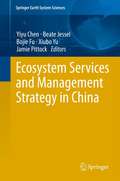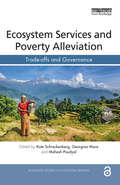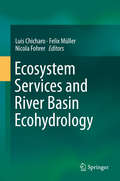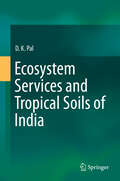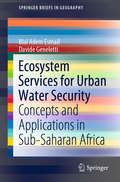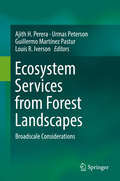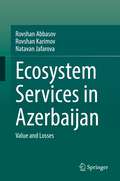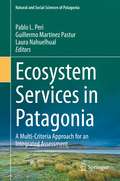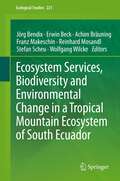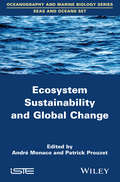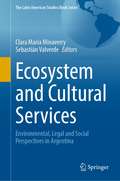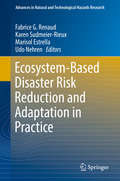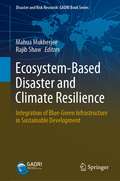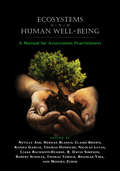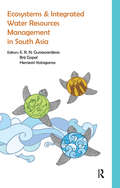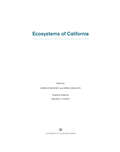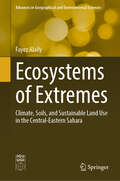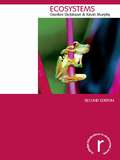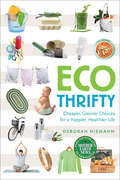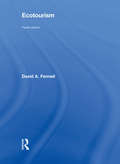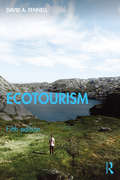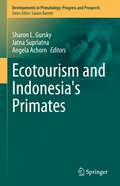- Table View
- List View
Ecosystem Services and Management Strategy in China
by Jamie Pittock Yiyu Chen Beate Jessel Bojie Fu Xiubo Yu"Ecosystem Services and Management Strategy in China" is a two-year international cooperation project that culminated from the China Council for International Cooperation on Environment and Development's Task Force on Ecosystem Services and Management. It combines case studies, scenario analysis, and stakeholder consultations that focus on Chinese forest, grassland and wetland ecosystems and assesses the economic and social benefits of sustainable ecosystems management. It also identifies better practices in ecosystem management from Chinese and international experience and recommends a more intensive integration of ecosystem services into decision-making processes. In November 2010, the Task Force presented five strategic policy proposals for the implementation of sustainable management for Chinese ecosystems. These proposals were extremely well-received by senior decision makers and have since been adopted by national government agencies. The book represents a valuable reference work for researchers and professionals working in related areas. Professor Yiyu Chen worked as president at the National Natural Science Foundation of China from 2004 to early 2013 and is Member of the Chinese Academy of Sciences. Professor Beate Jessel works as president at the Federal Agency for Nature Conservation, Germany. Professor Bojie Fu works at the Research Center of Eco-Environment Sciences, CAS and is Member of the Chinese Academy of Sciences. Professor Xiubo Yu works at the Institute of Geographic Sciences and Natural Resources Research, Chinese Academy of Sciences. Dr.Jamie Pittock is a Senior Lecturer at the Fenner School of Environment and Society, Australian National University, Australia.
Ecosystem Services and Poverty Alleviation: Trade-offs and Governance (Routledge Studies in Ecosystem Services)
by Kate Schreckenberg Georgina Mace Mahesh PoudyalUnderstanding how to sustain the services that ecosystems provide in support of human wellbeing is an active and growing research area. This book provides a state-of-the-art review of current thinking on the links between ecosystem services and poverty alleviation. In part it showcases the key findings of the Ecosystem Services for Poverty Alleviation (ESPA) programme, which has funded over 120 research projects in more than 50 countries since 2010. ESPA’s goal is to ensure that ecosystems are being sustainably managed in a way that contributes to poverty alleviation as well as to inclusive and sustainable growth. As governments across the world map how they will achieve the 17 ambitious Sustainable Development Goals, most of which have poverty alleviation, wellbeing and sustainable environmental management at their heart, ESPA’s findings have never been more timely and relevant. The book synthesises the headline messages and compelling evidence to address the questions at the heart of ecosystems and wellbeing research. The authors, all leading specialists, address the evolving framings and contexts for the work, review the impacts of ongoing drivers of change, present new ways to achieve sustainable wellbeing, equity, diversity, and resilience, and evaluate the potential contributions from conservation projects, payment schemes, and novel governance approaches across scales from local to national and international. The cross-cutting, thematic chapters challenge conventional wisdom in some areas, and validate new methods and approaches for sustainable development in others. The book will provide a rich and important reference source for advanced students, researchers and policy-makers in ecology, environmental studies, ecological economics and sustainable development. The Open Access version of this book, available at https://www.taylorfrancis.com/books/e/9780429016295, has been made available under a Creative Commons Attribution-Non Commercial-No Derivatives 4.0 license.
Ecosystem Services and River Basin Ecohydrology
by Luis Chicharo Felix Müller Nicola FohrerThis book provides an integrated analysis of the methodologies and main processes occurring at the entire river basin, from upstream until the coast, by merging the biological and hydrological processes with the social and economic components, thus providing an integrated framework for river basin management, integrating the ecohydrology approach with the ecosystem services concept.
Ecosystem Services and Tropical Soils of India
by D.K. PalThis book highlights ecosystem services of Indian tropical soils driven by soil properties. Soils are complex and important biomaterials and have an outstanding role in providing ecosystem services to mankind. The tropical soils have been traditionally and generally considered as either agriculturally poor or virtually useless by many. This book will discuss the difficulties encountered in managing Indian tropical soils in order to sustain their productivity. Some unique soil properties are yet to be linked explicitly to soil ecosystem services and soil care needs to be a constant research endeavour in the Indian tropical environment. This book highlights the new and unique soil knowledge base necessary to close the gap between food production and future population growth.
Ecosystem Services for Urban Water Security: Concepts and Applications in Sub-Saharan Africa (SpringerBriefs in Geography)
by Davide Geneletti Blal Adem EsmailThe book addresses the challenges of urban water security and adaptive management in Sub-Saharan Africa, exploring and interlinking novel concepts of ecosystems services, watershed investments, and boundary work. Specifically, the book’s goals are to (i) present a conceptual framework for the urban water sector from an ecosystem services perspective, highlighting the specificities of the Sub-Saharan context; (ii) develop an operational approach to designing and assessing the impacts of watershed investments, based on ecosystem services and boundary work; and (iii) test the approach through a case study in Asmara, Eritrea, and discuss the findings and lessons learned that can be applied in other contexts. Through a fully worked out case study, from identification of water challenges and opportunities to spatially explicit modelling, the book offers a sound and accessible, coverage of issues and proposed solutions to better operationalize ecosystem services, watershed investments and boundary work, to promote adaptive management, and achieve water security in the context of rapidly developing cities in Sub-Saharan Africa. The book is an effective tool for capacity building of diverse stakeholders on the urban water sector, including water managers, local and national policy-makers as well as a suitable resource for both undergraduate and post-graduate courses in planning and geography.
Ecosystem Services from Forest Landscapes: Broadscale Considerations
by Ajith H. Perera Urmas Peterson Guillermo Martínez Pastur Louis R. IversonOver the last two decades, the topic of forest ecosystem services has attracted the attention of researchers, land managers, and policy makers around the globe. The services rendered by forest ecosystems range from intrinsic to anthropocentric benefits that are typically grouped as provisioning, regulating, supporting, and cultural. The research efforts, assessments, and attempts to manage forest ecosystems for their sustained services are now widely published in scientific literature. This volume focuses on broad-scale aspects of forest ecosystem services, beyond individual stands to large landscapes. In doing so, it illustrates the conceptual and practical opportunities as well as challenges involved with planning for forest ecosystem services across landscapes, regions, and nations. The goal here is to broaden the scope of land use planning through the adoption of a landscape-scale approach. Even though this approach is complex and involves multiple ecological, social, cultural, economic, and political dimensions, the landscape perspective appears to offer the best opportunity for a sustained provision of forest ecosystem services.
Ecosystem Services in Azerbaijan: Value and Losses
by Rovshan Abbasov Rovshan Karimov Natavan JafarovaThis book aims to draw readers' attention to the benefits once present nature in Azerbaijan. Over the past hundred years, much of this has been lost because of the neglect of the intrinsic values of nature by both managers and local authorities, and the overuse of natural resources. For example, oil pollution and overfishing in the Caspian Sea have almost destroyed its fish and caviar resources. In this volume, the authors distinguish between the concepts of "gain" and "income" and show readers that short-term benefits based solely on monetary income deprive people and nature itself of long-term, lasting value. The book provides readers with real historical information, discusses the interactions between humans and nature, and shows, with real data and trends, the consequences of anthropogenic activity on natural resources in Azerbaijan. The authors cover fish, water, forest, mountain, and pasture ecosystems, draw attention to the impacts that pollution and other forms of environmental degradation have had on these resources, and the show the impact that resource depletion on people’s livelihoods. The book is intended primarily for managers, policymakers, students, and academics, and will be of interest to natural scientists, historians, and students of culture.
Ecosystem Services in Patagonia: A Multi-Criteria Approach for an Integrated Assessment (Natural and Social Sciences of Patagonia)
by Guillermo Martínez Pastur Pablo L. Peri Laura NahuelhualThis book aims to quantify and discuss how societies have directly and indirectly benefited from ecosystem services in Patagonia; not only in terms of provisioning and cultural services, but also regulating and supporting services. Patagonia, a region that stretches across two countries (ca. 10% in Chile and 90% in Argentina), is home to some of the most extensive wilderness areas on our planet. Natural grasslands comprise almost 30% of the Americas, including the Patagonian steppe, while Patagonian southern temperate forests are important for carbon sequestration and storage, play a pivotal role in water regulation, and have become widely recognized for their ecotourism value. However, profound changes are now underway that could affect key ecosystem functions and ultimately human well-being. In this context, one major challenge we face in Patagonia is that ecosystem services are often ignored in economic markets, government policies and land management practices. The book explores the synergies and trade-offs between conservation and economic development as natural landscapes and seascapes continue to degrade in Patagonia. Historically, economic markets have largely focused on the provisioning services (forest products, livestock) while neglecting the interdependent roles of regulating services (erosion and climate control), supporting services (nutrient cycling) and cultural services (recreation, local identity, tourism). Therefore, the present work focuses on ecosystem functions and ecosystem services, as well as on trends in biodiversity and the interactions between natural environments and land-use activities throughout Patagonia.
Ecosystem Services, Biodiversity and Environmental Change in a Tropical Mountain Ecosystem of South Ecuador
by Erwin Beck Reinhard Mosandl Achim Bräuning Franz Makeschin Jörg Bendix Stefan Scheu Wolfgang WilckeAn interdisciplinary research unit consisting of 30 teams in the natural, economic and social sciences analyzed biodiversity and ecosystem services of a mountain rainforest ecosystem in the hotspot of the tropical Andes, with special reference to past, current and future environmental changes. The group assessed ecosystem services using data from ecological field and scenario-driven model experiments, and with the help of comparative field surveys of the natural forest and its anthropogenic replacement system for agriculture. The book offers insights into the impacts of environmental change on various service categories mentioned in the Millennium Ecosystem Assessment (2005): cultural, regulating, supporting and provisioning ecosystem services. Examples focus on biodiversity of plants and animals including trophic networks, and abiotic/biotic parameters such as soils, regional climate, water, nutrient and sediment cycles. The types of threats considered include land use and climate changes, as well as atmospheric fertilization. In terms of regulating and provisioning services, the emphasis is primarily on water regulation and supply as well as climate regulation and carbon sequestration. With regard to provisioning services, the synthesis of the book provides science-based recommendations for a sustainable land use portfolio including several options such as forestry, pasture management and the practices of indigenous peoples. In closing, the authors show how they integrated the local society by pursuing capacity building in compliance with the CBD-ABS (Convention on Biological Diversity - Access and Benefit Sharing), in the form of education and knowledge transfer for application.
Ecosystem Services: Economics and Policy (Palgrave Studies in Natural Resource Management)
by Stephen MuddimanThis book bridges the gap between economic and ecological theory and practice. Its main focus is on how the principles of the Austrian School of economics could improve the validity of Ecosystem Services.The concept of ‘Ecosystem Services’ is a relatively recent innovation in environmental thought. The current system is dependent upon mainstream economic theory, in which monetary and fiscal policy controls the prevailing health of the economy. The dependence on this approach to finance, Muddiman argues, limits the potential of ecosystem services and exacerbates the effects of the existing flawed economic model. The book highlights the links between ecological and economic methodologies and concepts and outlines how the principles of Austrian Economic theory could provide better environmental outcomes. It then goes on to formulate approaches to ecosystem services which could act as drivers towards a new biodiversity-based economic framework built around distributed ledger technology, or ‘blockchain’. The key distinction of this book is its consideration of ecosystem services as a function of the current economic system. Using this as a starting point it investigates how an alternative economic model would achieve the integration of environmental considerations into economic decision making.
Ecosystem Sustainability and Global Change
by Patrick Prouzet André MonacoThis volume provides various examples and dimensions, chemical, biological, climatic, or related to extreme (hazards). It describes, by reciprocity, the vulnerability of ecosystems, resources, heritage, human health and, consequently, economic and social sectors. it considers climate scenarios and socio-economic status indicators research, design strategies and patterns of adaptation, development of innovative monitoring systems, analysis of perceptions of major hazards and valuation of ecosystem services.
Ecosystem and Cultural Services: Environmental, Legal and Social Perspectives in Argentina (The Latin American Studies Book Series)
by Clara María Minaverry Sebastián ValverdeThis book describes cases and experiences in connection with environmental and cultural ecosystem services in Argentina. It contributes to the debate in connection with different approaches to analyse ecosystem services, focusing on the environment, the Law and social perspectives and concerns. Among the topics discussed are the implementation of the National Forests Act, the regulation and recognition of ecosystem services, the role of indigenous people, the policies in place for nature and forest conservation in different regions of Argentina. This book is one of the few research studies about cultural ecosystem services developed in Latin America and presents an attractive combination of the legal, environmental and social approaches and was written by an interdisciplinary team of academics who have theoretical and practical experience in this region where there is a valuable natural and cultural heritage.
Ecosystem-Based Disaster Risk Reduction and Adaptation in Practice
by Fabrice G. Renaud Karen Sudmeier-Rieux Marisol Estrella Udo NehrenThis book is a compilation of recent developments in the field of ecosystem-based disaster risk reduction and climate change adaption (Eco-DRR/CCA) globally. It provides further evidence that ecosystem-based approaches make economic sense, and showcases how research has progressively filled knowledge gaps about translating this concept into practice. It presents a number of methods, and tools that illustrate how Eco-DRR/CCA has been applied for various ecosystems and hazard contexts around the world. It also discusses how innovative institutional arrangements and policies are shaping the field of Eco-DRR/CCA. The book is of relevance to scientists, practitioners, policy-makers and students in the field of ecosystem management for disaster risk reduction and climate change adaptation.
Ecosystem-Based Disaster and Climate Resilience: Integration of Blue-Green Infrastructure in Sustainable Development (Disaster and Risk Research: GADRI Book Series)
by Rajib Shaw Mahua MukherjeeThis book provides an introduction to the critical role of ecosystem-based disaster risk resilience (Eco-DRR) for building community resilience to multiple environmental risks such as rising heat, water stress, and pollution. Blue-green infrastructure (BGI) is an Eco-DRR tool that is an under-explored paradigm and can respond as one common strategy to targets set by the Sustainable Development Goals (UNDP), Climate Agreements (UNEP), the Sendai Framework (UNISDR), and the New Urban Agenda (UNCHS). Highlighted here in a systematic way is the importance of blue-green infrastructures in resilience building. The purpose is to introduce readers to the challenging context of development and opportunity creation for Eco-DRR. The roles of policy, scientific research, and implementation are presented cohesively. An attractive proposition of the book is a collection of case studies from different parts of the world where integration of BGI is experimented with at various levels of success. It envisages that shared tacit experiences from the realm of practice will further strengthen explicit knowledge. The focus in this book is on need and context building, policy and science (investigation, analysis, and design), case studies, and a road map for the future in four successive parts. Each part is self-sufficient yet linked to its predecessor, successor, or both, as the case may be.
Ecosystems and Human Well-Being: A Manual for Assessment Practitioners (Five Volume Set Ser.)
by Thomas Tomich Monika Zurek Neville Ash Hernán Blanco Keisha Garcia Bhaskar ViraDesigned by a partnership of UN agencies, international scientific organizations, and development agencies, the Millennium Ecosystem Assessment (MA) is the most extensive study ever of the linkages between the world's ecosystems and human well-being. The goal of the MA is to establish the scientific basis for actions needed to enhance the contribution of ecosystems to human well-being without undermining their long-term productivity. With contributions by more than 500 scientists from 70 countries, the MA has proven to be one of the most important conservation initiatives ever undertaken, and the ecosystem services paradigm on which it is based provides the standard for practice. This manual supplies the specific tools that practitioners of the paradigm need in order to extend their work into the future. The manual is a stand-alone "how to" guide to conducting assessments of the impacts on humans of ecosystem changes. In addition, assessment practitioners who are looking for guidance on particular aspects of the assessment process will find individual chapters of this manual to be useful in advancing their understanding of best practices in ecosystem assessment. The manual builds on the experiences and lessons learned from the Millennium Ecosystem Assessment global and sub-global assessment initiatives, with chapters written by well-known participants in those initiatives. It also includes insights and experiences gained from a wider range of ecosystem service-focused assessment activities since the completion of the MA in 2005.
Ecosystems and Integrated Water Resources Management in South Asia
by E. R. N. Gunawardena; Brij Gopal; Hemesiri KotagamaThis book provides an ecosystem perspective in addressing the water resource management issues in the South Asian region. It argues that aspects such as sources of water, its distribution and users; land–water interrelations; drivers of change such as laws, policies and institutions; management of issues and technologies related to water supply; institutional set-up; economic instruments such as pricing, taxes, subsidies; and economics of ecosystem services are crucial. Climate changes, melting of glaciers and polar ice caps, rising sea level and the increased frequency of extreme events, have to be factored into integrated management of water resources. This book addresses some of these major issues related to aquatic ecosystems and focuses on three major aspects: (a) concepts related to ecosystems, ecosystem services and their linkages with water; (b) human impacts on ecosystems, particularly the aquatic ecosystems, and their assessment; and (c) the management, including policy, governance and economics. Comprising new theories, research and case studies, the book will be useful those concerned with water resource management – professionals, students and researchers.
Ecosystems of California
by Harold Mooney Erika ZavaletaThis long-anticipated reference and sourcebook for California's remarkable ecological abundance provides an integrated assessment of each major ecosystem type--its distribution, structure, function, and management. A comprehensive synthesis of our knowledge about this biologically diverse state, Ecosystems of California covers the state from oceans to mountaintops using multiple lenses: past and present, flora and fauna, aquatic and terrestrial, natural and managed. Each chapter evaluates natural processes for a specific ecosystem, describes drivers of change, and discusses how that ecosystem may be altered in the future. This book also explores the drivers of California's ecological patterns and the history of the state's various ecosystems, outlining how the challenges of climate change and invasive species and opportunities for regulation and stewardship could potentially affect the state's ecosystems. The text explicitly incorporates both human impacts and conservation and restoration efforts and shows how ecosystems support human well-being. Edited by two esteemed ecosystem ecologists and with overviews by leading experts on each ecosystem, this definitive work will be indispensable for natural resource management and conservation professionals as well as for undergraduate or graduate students of California's environment and curious naturalists.
Ecosystems of Extremes: Climate, Soils, and Sustainable Land Use in the Central-Eastern Sahara (Advances in Geographical and Environmental Sciences)
by Fayez AlailyThis book explores the environmental conditions, particularly the climate and soils, of one of the driest regions on earth, the Central-East of the Sahara. These factors control the ecosystems and determine the land's suitability for use. The area receives only 0.5 mm of precipitation annually and contains one of the largest aquifers in the Sahara, with fossil groundwater. The region's lithology includes Cretaceous formations and crystalline rocks, largely covered by quaternary sediments. Exogenous activities have shaped various landscape types, such as ergs with different dunes, deflated depressions with playas, and yardangs. Soils in the region are primarily formed through physical processes and are often shallow, sandy, and enriched with soluble salts. The book provides a detailed analysis of their physical and chemical properties, genesis, and relation to environmental factors and sociological aspects. It also discusses rare ecosystems, including those dependent on food imports and those that arise episodically and last for a few years. Considering all ecological parameters, a land assessment system for irrigated agriculture is developed, along with descriptions of suitable cultivation methods and optimal irrigation systems. The book's contents are based on data from several expeditions and laboratory work funded by the German Research Foundation.
Ecosystems: A Functional Approach (Routledge Introductions to Environment: Environmental Science)
by Kevin Murphy Gordon DickinsonIn examining both theory and applications, this book, through useful examples, provides a stimulating introduction to ecosystems. It examines the nature, types and characteristics of ecosystems as well as investigating the interactions between various systems and human actions. Using functional ecology as the basis for applying the ecosystem concept in contemporary environmental science and ecology, this second edition of this highly successful volume has been updated to reflect the latest research. It incorporates a strengthened theme in the use of functional ecology in explaining how ecosystems work and how the ecosystem concept may be used in science and applied science, and coverage of the interactions between humans and ecosystems has been substantially bolstered with the addition of chapters on human impacts and large scale impacts on ecosystems, and global environmental change and the consequences for ecosystems.Presented in a student-friendly format, this book features boxed definitions, examples, case studies, summary points, discussion questions and annotated further reading lists. It provides a concise and accessible synthesis of both ecosystem theory and its applications, and will be a valuable resource for students of environmental studies, ecology and geography.
Ecotherapy: Healing Ourselves, Healing the Earth
by Robert AndersonHere is a trailblazing book on issues of vital interest to the future of humankind. Ecotherapy: Healing Ourselves, Healing the Earth sheds light on humankind’s most serious health challenge ever--how to save our precious planet as a clean, viable habitat. As a guide for therapists, health professionals, pastoral counselors, teachers, medical healers, and especially parents, Ecotherapy: Healing Ourselves, Healing the Earth highlights readers’strategic opportunities to help our endangered human species cope constructively with the unprecedented challenge of saving a healthful planet for future generations. <p><p> Ecotherapy: Healing Ourselves, Healing the Earth introduces readers to an innovative approach to ecologically-grounded personality theory, spirituality, ecotherapy, and education. The book shares the author’s well-developed theories and methods of ecological diagnosis, treatment, and education so professionals and parents, our most influential teachers, can rise to the challenge of saving our planet. <p> A systematic theory and practice guidebook, Ecotherapy: Healing Ourselves, Healing the Earth fills a wide gap in both the counseling and therapy literature and the ecology literature. It offers an innovative model for fulfilling the “ecological circle” between humans and nature with three action dimensions. These are self-care by being intentionally nurtured by nature; spiritual enrichment by enjoying the transcendent Spirit in nature; and responding by nurturing nature more responsibly and lovingly. <p> The theories and practical applications presented in the book come together to explore long-overlooked issues at the boundary between human health and the health of the natural environment. Psychotherapists, health professionals, and teachers; pastoral counselors and other clergy who counsel and teach; laypersons who are parents and grandparents; and individuals and groups interested in environmental issues will find Ecotherapy: Healing Ourselves, Healing the Earth essential for approaching the long-neglected earthy roots of the total human mind-body-spirit organism.
Ecothrifty: Cheaper, Greener Choices for a Happier, Healthier Life (Mother Earth News Books for Wiser Living)
by Deborah NiemannA guide to saving a fortune while saving the Earth, from the author of Homegrown & Handmade. Use it up, wear it out, make it do, or do without. Our grandmothers knew the importance of responsible, thrifty choices. But somewhere along the way we lost our way and succumbed to the belief that we can get everything for next to nothing, have it shipped halfway around the world and then—more often than not—just throw it away. This consumer binge is taking its toll. Diet and lifestyle-related illnesses are epidemic, our environment is awash in a sea of plastic, our climate is changing, and the cost of everything is skyrocketing with the price of oil. Are we doomed? No. We can make greener, healthier choices, and we can do it while saving money. Where to start? Ecothrifty is packed with simple, practical ideas and recipes to help you:· Make homemade products for cleaning and skin care · Grow your own food and cook more from scratch · Raise your family without lowering your standards A must-read for anyone who has ever wanted to live a greener life but thought that it would be too expensive, time-consuming, or difficult, this handy, complete guide will show you how small changes can have a huge environmental impact and save you thousands of dollars, all while improving your quality of life.&“I support and endorse this wonderful book, 100%!&” —Ed Begley, Jr., actor and environmentalist&“Her advice does not come across as self-righteous or preachy, but more like insider tips from an experienced do-it-yourselfer.&” —Publishers Weekly
Ecotopia 2121: A Vision for Our Future Green Utopia?in 100 Cities
by Alan MarshallA 2016 Green Book Festival "Future Forecasts" WinnerA stunningly original, lushly illustrated vision for a Green Utopia, published on the 500th anniversary of the original Big Idea.Five hundred years ago a powerful new word was unleashed upon the world when Thomas More published his book Utopia, about an island paradise far away from his troubled land. It was an instant hit, and the literati across Europe couldn't get enough of its blend of social fantasy with a deep desire for a better world. Five hundred years later, Ecotopia 2121 once again harnesses the power of the utopian imagination to confront our current problems, among them climate change, and offer a radical, alternative vision for the future of our troubled planet.Depicting one hundred cities around the globe-from New York to San Francisco, London, Tokyo, Sydney, Rio de Janeiro, Mexico City, Beijing, Vienna, Singapore, Cape Town, Abu Dhabi, and Mumbai-Alan Marshall imagines how each may survive and prosper. A striking, full-color scenario painting illustrates each city. The chapters tell how each community has found either a social or technological innovation to solve today's crises. Fifteen American cities are covered. Around the world, urban planners like to tailor scenarios for the year 2020, to take advantage of the metaphor of 20-20 vision. In Ecotopia 2121, the vision may be fuzzy, but its sharp insights, captivating illustrations, and playful storytelling will keep readers coming back again and again.
Ecotourism
by David A. FennellEcotourism continues to be embraced as the antithesis of mass tourism because of its promise of achieving sustainability through conservation mindedness, community development, education and learning, and the promotion of nature based activities that were sensitive to both ecological and social systems. The extent to which this promise has been realised is open to debate. Focusing on an array of economic, social and ecological inconsistencies that continue to plague ecotourism in theory and practice, the volume examines ecotourism in reference to other related forms of tourism, impacts, conservation, sustainability, education and interpretation, policy and governance, and the ethical imperative of ecotourism as these apply to the world’s greenest form of tourism. Ecotourism is a growing field attracting increasing attention from students and academics. Fennell provides an authoritative and comprehensive review of the most important issues that continue to both plague ecotourism and make it one of the most dynamic sectors in the tourism industry. It covers a comprehensive range of themes and geographical regions. Building on the success of prior editions, Ecotourism has been revised throughout to incorporate recent research and benefits from the introduction of real-life case studies and summaries of recent literature. An essential reference for those interested in Ecotourism, the book is accessible to students but retains the depth required for use by researchers and practitioners in the field. New chapters on the theory and application of animal ethics; community development in sustainable tourism; and education and learning in the field have added further value to an already very comprehensive volume. This book will be of interest to students across a range of disciplines including geography, economics, business, ethics, biology, and environmental studies.
Ecotourism
by David A. FennellThe new fifth edition of Ecotourism focuses on an array of economic, social and ecological inconsistencies that continue to plague ecotourism in theory and practice, and examines the sector in reference to other related forms of tourism, impacts, conservation, sustainability, education and interpretation, policy and governance, and the ethical imperative of ecotourism as these apply to the world&’s greenest form of tourism. Building on the success of prior editions, the text has been revised throughout to incorporate recent research, including ecotourism taking place in under-represented world regions. It includes new case studies on important themes in research and practice as well as learning objectives in each chapter. David Fennell provides an authoritative and comprehensive review of the most important issues, including climate change and UN Sustainable Development Goals. Ecotourism continues to be embraced as the antithesis of mass tourism because of its promise of achieving sustainability through conservation mindedness, community development, education and learning, and the promotion of nature-based activities that are sensitive to both ecological and social systems. The book debates to what extent this promise has been realised. An essential reference for those interested in ecotourism, the book is accessible to students, but retains the depth required for use by researchers and practitioners in the field. This book will be of interest to students across a range of disciplines including geography, economics, business, ethics, biology, and environmental studies.
Ecotourism and Indonesia's Primates (Developments in Primatology: Progress and Prospects)
by Sharon L. Gursky Jatna Supriatna Angela AchornThe basic goal of the volume is to compile the most up to date research on the effect of ecotourism on Indonesia’s primates. The tremendous diversity of primates in Indonesia, in conjunction with the conservation issues facing the primates of this region, have created a crisis whereby many of Indonesia’s primates are threatened with extinction. Conservationists have developed the concept of “sustainable ecotourism” to fund conservation activities. National parks agencies worldwide receive as much as 84% of their funding from ecotourism. While ecotourism funds the majority of conservation activities, there have been very few studies that explore the effects of ecotourism on the habitat and species that they are designed to protect. It is the burgeoning use of “ecotourism” throughout Indonesia that has created a need for this volume where the successes and pitfalls at various sites can be identified and compared.
